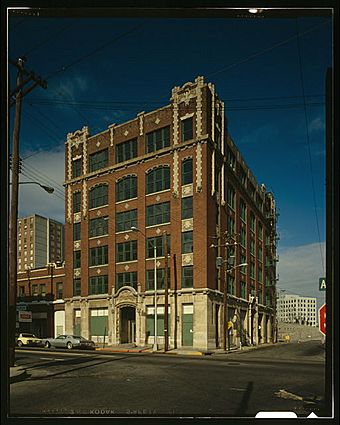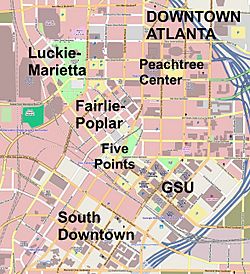Odd Fellows Building and Auditorium facts for kids
Quick facts for kids |
|
|
Odd Fellows Building and Auditorium
|
|

Front and side elevations, 1979
|
|
| Location | 228–250 Auburn Avenue, NE, Atlanta, Georgia |
|---|---|
| Built | Building, 1912; Auditorium, 1913 |
| Architect | William Augustus Edwards; Robert E. Pharrow, builder |
| Architectural style | Tudor Revival, Other, Skyscraper |
| NRHP reference No. | 75000594 |
| Added to NRHP | May 2, 1975 |
The Odd Fellows Building and Auditorium are two important historic buildings in Atlanta, Georgia. They are located in the Sweet Auburn Historic District, a famous area in Atlanta. Built in 1912 and 1913, these buildings were once the main headquarters for a group called the Grand United Order of Odd Fellows in America.
These buildings were designed by a well-known architect named William Augustus Edwards. They played a big part in the history of Atlanta's Black community. In 1975, both buildings were added to the National Register of Historic Places. This means they are recognized as very important historical sites.
Contents
What are the Odd Fellows Buildings?
The Odd Fellows Building is often called the Tower. It stands tall at six stories high. Right next to it is the Auditorium, known as the Annex. The Annex is two stories tall, but it has a special open space inside called an atrium. This atrium makes parts of the building feel two or three stories taller.
Both buildings are made mostly of red brick. However, the first floor of the Tower is built with stone. For many years, the Annex was used as a movie house. It was special because it was one of the only major places in Atlanta where Black people could sit on the main floor to watch movies.
How the Buildings Were Used
The Odd Fellows Building (the Tower) was more than just a meeting place for the Odd Fellows group. It also offered office and store spaces. These spaces were rented out to Black-owned businesses and Black professionals. This was very important at a time when opportunities were limited.
The flat roof of the Tower was even used for dances and social gatherings for many years. It was a lively place for the community.
Who Built and Dedicated Them?
The Odd Fellows Building and Auditorium were built for the District Grand Lodge No. 18 of the Grand United Order of Odd Fellows in America. This group was based in Georgia. B.S. Ingram was the District Grand Master at the time. Dr. William F. Penn was in charge of the building committee.
The famous architect William Augustus Edwards created the designs for these buildings. Robert E. Pharrow was the main builder, and M.B. Morton was the superintendent, overseeing the construction work.
A very important leader, Booker T. Washington, helped dedicate the Odd Fellows Building in 1912. This shows how significant the building was even when it was first opened.
Benjamin Jefferson Davis, Sr.'s Connection
The Odd Fellows Building and Auditorium are strongly connected to Benjamin Jefferson Davis, Sr. He was a very important Black journalist in Atlanta from 1870 to 1945. He edited a newspaper called the Atlanta Independent. This newspaper was the official publication for the Odd Fellows group, District No. 18.
Benjamin Jefferson Davis, Sr. was also the District Grand Secretary for the Odd Fellows. He was a member of the committee that helped plan and build these historic structures. His involvement highlights the buildings' importance to the Black community and its leaders.
National Recognition
On May 2, 1975, both the Odd Fellows Building and the Auditorium were officially added to the National Register of Historic Places. This listing helps protect these buildings and recognizes their special place in American history. It means they are important for their architecture, their role in community life, and their connection to significant historical events.
 | George Robert Carruthers |
 | Patricia Bath |
 | Jan Ernst Matzeliger |
 | Alexander Miles |


